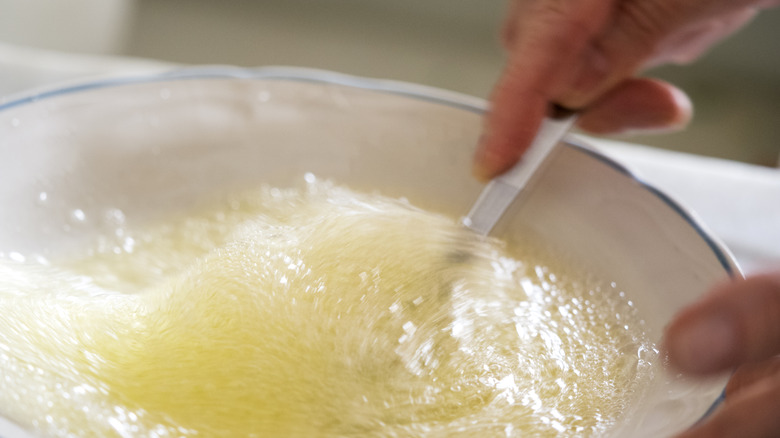What's Really Hiding Inside A Carton Of Liquid Eggs
Eggs have become a star of the health and wellness world, packing an astounding number of nutrients into relatively small packages. From protein and "good" fat to vitamins and iron, the nutritional stores in eggs are impressive.
But what happens if you're having trouble finding shelled eggs for cooking and baking? In that case, you might consider turning to liquid eggs, since they're much more available. After all, the liquid egg market is expected to expand to more than $9.7 million by 2033 due to global demand for egg products (via Future Market Insights). However, be aware that though liquid eggs are made from natural shelled eggs, they can contain other unexpected ingredients. And while each of those ingredients is technically deemed safe, one or two could be on your "avoid" or "limit" list.
To give you a better understanding of what ingredients could be hiding in your liquid eggs package, Health Digest asked Jamie Koll for guidance. Koll is a non-toxic living and ingredient expert with health coaching certification through the Institute for Integrative Nutrition (IIN). Koll agrees that liquid eggs can be as healthy as regular eggs, but notes that their total nutritional value may be altered by several non-egg ingredients.
Additives for extended shelf life
Unlike eggs that you'd buy in a carton, liquid eggs aren't encapsulated in a natural, protective shell. Because they're exposed to the air, they may be more likely to break down. To stretch out their shelf life, manufacturers will sometimes add preservatives into the raw liquid eggs.
Jamie Koll names citric acid as one of the primary preservatives used in liquid egg varieties. Citric acid both keeps foods fresher for longer, as well as gives them a boost of flavor. In fact, plenty of foods aside from liquid eggs rely on citric acid as a stabilizer, including some juices, canned goods, and sweets.
Is there anything to be concerned about if you see citric acid on your liquid eggs label? Not necessarily. Just be aware that citric acid can be created from black mold, according to ChemicalSafetyFacts. Consequently, if you're allergic or sensitive to mold, you could have a reaction to foods containing citric acid from black mold sources.
Oils and thickeners for a smoother texture
Another ingredient that Jamie Koll identifies as being in some liquid egg brands is oil. And some types of oils can encourage inflammation, such as corn oil. The Arthritis Foundation recommends limiting the consumption of corn oil for this reason. Corn oil contains omega-6 fatty acids. Though omega-6 fatty acids aren't inherently "bad" for you, they can become triggers for inflammation. So, if you're trying to reduce your intake of omega-6 products or you have arthritis or a similar condition, you may want to bypass liquid eggs that have corn oil as one of the ingredients.
Even if oils aren't present, Koll has seen liquid eggs that depend upon food additives such as xanthan or guar gum. These can help keep the product together and keep it from spoiling too soon. Fortunately, neither xanthan nor guar gum is toxic. That said, although xanthan gum is widely tolerated, some people may experience temporary stomach or bowel problems after ingesting it. As for guar gum, though rare, it may trigger allergies in consumers with sensitivities.
Missing ingredients in liquid eggs
Ironically, some liquid egg products might not be as nutrient dense as regular eggs because they lack the yolk — and therefore don't have the nutritional punch you might expect. "If the entire egg was used (egg white and yolk), then this would be most similar to normal eggs as it can provide the same amount of protein, fat, vitamins, and minerals as regular eggs," says Jamie Koll. But what happens if you only have a package of liquid egg whites? "Liquid egg whites are a good source of protein, but do not have the vitamins and minerals found in the yolk, like vitamin D, vitamin A, and choline."
Be sure you're buying the right type of liquid egg product. After all, there's nothing wrong with cooking just egg whites. And if you prefer liquid egg whites to liquid whole eggs, you might be able to find some that have been fortified with vitamins and minerals. Just keep Koll's egg-cellent advice in mind when you're evaluating all of your liquid egg options: "Checking the ingredient label is key."



